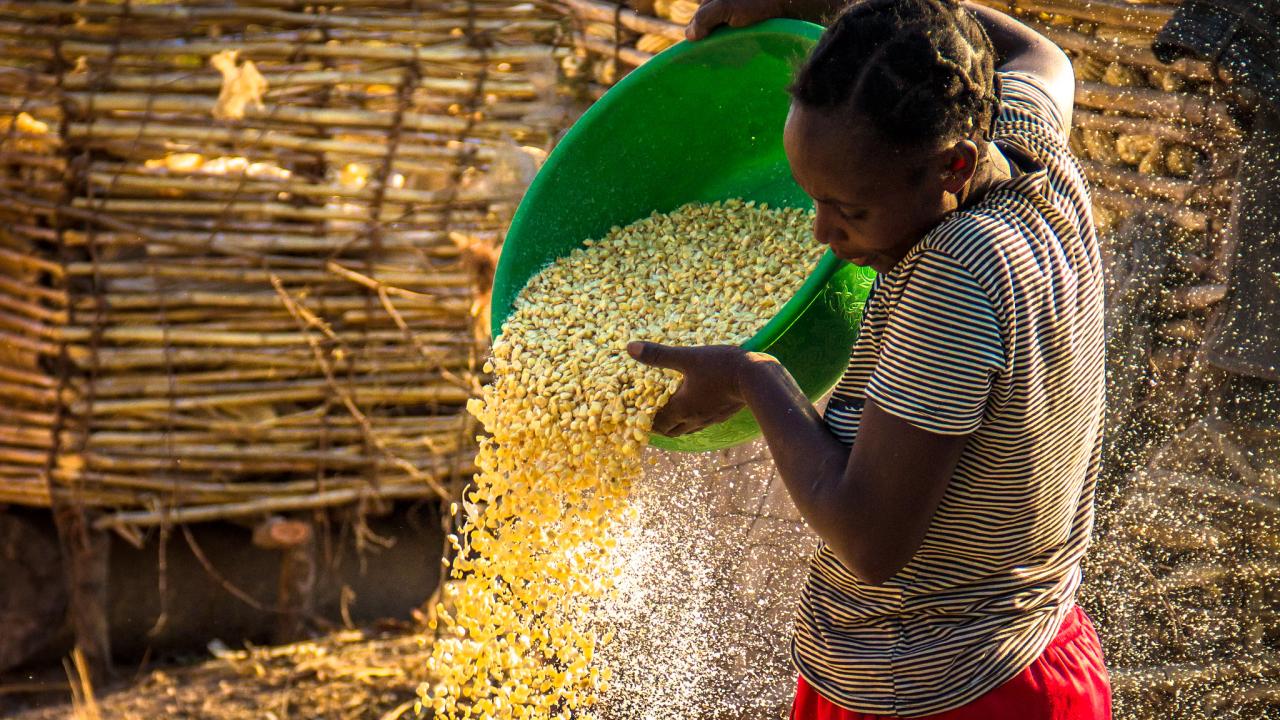
New Research Shortens the Hungry Season and Increases Maize Productivity in Rural Zambia
During the hungry season in Zambia, maize-farming families face shortfalls in food and savings long before the next harvest. New research shows that the way people budget can make a difference.
Feed the Future Innovation Lab for Markets, Risk & Resilience research led by UC Berkeley, UC Santa Barbara and the University of Zambia developed and tested a simple budgeting activity in maize-farming communities. Results of their randomized evaluation show that the budgeting activity stretched people’s savings, reducing the severity and duration of the hungry season while also unlocking the means to invest more in generating larger crop yields the following year.
“This kind of focused budgeting activity at the time of harvest could support rural families through cyclical food shortages while also establishing a foundation to improve their future welfare,” the research team wrote in a new policy brief announcing their results.
Breaking Down the Year’s Expenses to Change Beliefs
In the Zambian communities where the research took place, maize-farming families typically pay for all the year’s expenses from a single harvest. That single harvest represents food as well as a form of savings that they can sell to pay for expenses like school fees, household supplies and even inputs for next year’s maize planting.
The research team thought that there may be a disconnect between the seeming abundance of bags of maize at harvest time and the year’s expenses. Drawing from literature in psychology, the research team created a budgeting activity that would put the year’s costs in perspective.
The activity was designed to overcome a common planning fallacy called the “segmentation effect.” This fallacy makes it seem like the time for a single task is smaller than the sum of time for the individual small tasks that it comprises. This idea can also apply to how people budget.
“While maize-farming households in Zambia have lifetimes of experience managing annual budgets, hungry season shortfalls may be due in part to underestimating their spending needs,” the research team wrote in the new brief.
Stretching Budgets with Maize Farmers in Zambia
From 2019-2020, 837 maize-farming households from 113 villages in Zambia took part in a study supported by the United States Agency for International Development (USAID) to test the impacts of the team’s budgeting activity. The team tracked savings and spending for participants in both groups across the duration of the study.
Roughly half of the study’s participants conducted the budgeting activity in which they forecasted the next year’s spending across seven specific categories. The other half of households made up the experiment’s control group and provide a comparison to show the impacts of the activity itself.
The two groups of showed immediate differences. Participants who took part in the detailed budgeting activity immediately increased their estimates of the year’s non-food expenses by 20-60 percent on average. Participants who did not conduct the budgeting activity overestimated their future savings by 81 percent on average, and across the year spent roughly double their initial forecast.
These choices had severe consequences. About half of households in the control group completely exhausted their store of maize before the next season’s harvest.
Addressing the Pressing Challenge of Seasonal Hunger
Food security is a real challenge in the communities where this study took place. In the study’s initial surveys, the number of participants who reported not having enough to eat rose from 2 percent in June, right after harvest, to roughly half by February.
In addition to shortening the hungry season, the budgeting activity improved future maize productivity by 9 percent. The reasons for this increase were that, with more to spend across the year from more accurate budgeting, people reduced their off-farm labor, hired more help and spent more on productive inputs.
“While the challenge of seasonality has previously been met with interventions that aimed at increasing income, such as credit or incentives for migration, our focused budgeting activity addresses one of seasonality’s root causes, which is savings,” the researchers wrote. “Treating seasonality as a savings problem can complement policies that seek to support families through cyclical food shortages while also establishing a foundation to improve their future welfare.”
The research team is discussing this research in a USAID Agrilinks webinar on April 20, 2023 at 9:30am EDT. Register now.
Media contacts:
- Alex Russell: parussell@ucdavis.edu
- Matthew Kertman: kertman@berkeley.edu
This research was funded by the Feed the Future Innovation Lab for Markets, Risk & Resilience, the United States Agency for International Development’s Development Innovation Ventures (DIV), the Center for Effective Global Action (CEGA) at UC Berkeley, the National Science Foundation and the International Growth Centre. This article is made possible by the generous support of the American people through the United States Agency for International Development (USAID). The contents are the responsibility of the Feed the Future Innovation Lab for Markets, Risk & Resilience and do not necessarily reflect the views of USAID, the University of California, or the United States Government. The U.S. Agency for International Development administers the U.S. foreign assistance program providing economic and humanitarian assistance in more than 80 countries worldwide.
